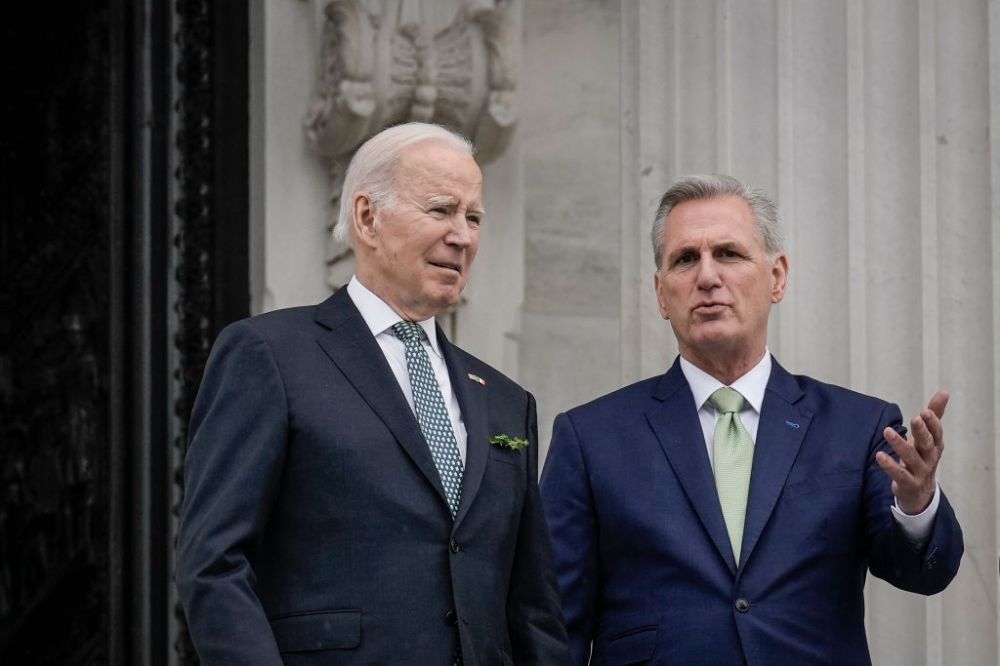President Joe Biden so far has refused to negotiate with Republicans on raising the debt ceiling. But GOP leaders, trying to unify an unruly conference that wants to extract as much as it can from the showdown, are now looking for ways to force Biden’s hand.
Before leaving for a two-week recess, Republicans signaled they’ll likely try to pass their own debt ceiling bill, without waiting to strike a deal with Democrats first.
“We need to send over what we think ought to be part of the debt limit and let the Senate respond, let the Biden administration respond,” said Rep. Gary Palmer, the chairman of the House GOP Conference’s policy committee.
And Rep. Kevin Hern, chair of the Republican Study Committee, told reporters last week he expects GOP leaders to draft a comprehensive list of debt ceiling demands by the end of May, probably before Republicans cobble together a budget. Yet it may not get lawmakers any closer to an agreement: Democrats suggest they’ll ignore such overtures, insisting on a clean bill to raise the nation’s $31.4 trillion borrowing limit.
The clock is ticking. The government hit the debt ceiling earlier this year, and the Treasury Department has been moving money around since then in what’s known as “extraordinary measures” to avoid default. Absent legislative action, the nonpartisan Congressional Budget Office estimates default could come between July and September. (I have impeccable timing and will be on maternity leave by that point—have fun, everyone!)
Lawmakers are growing restless.
“At some point when you get close to a deadline, if you will, the markets are going to get spooked and you’re going to have an impact on the interest rate in this country that will take a long time to overcome,” Utah Republican Sen. Mitt Romney told reporters last week.
He drily noted that many Republicans went along with debt ceiling hikes without much fuss when former President Donald Trump was in office, but “somehow when we have a Democrat as president, we find religion.”
Newly empowered congressional Republicans were never going to be willing to advance a clean debt ceiling increase this year. For one thing, GOP voters—frustrated with Democrats’ sweeping spending bills over the past two years—wouldn’t allow it. And the deadline is one of the few points of leverage House Republicans have in a divided government to advance their goals. Members want to seize the opportunity to the fullest.
Most House Republicans hope to significantly roll back government spending, with some calling for a return to fiscal year 2022 levels. That’s roughly a $130 billion cut. Biden has rejected the idea of tying government funding cuts to the debt ceiling. He plans to keep spending talks separate, and before they can begin in earnest, he wants Republicans to come up with their own detailed budget to identify where they’d like to make spending cuts. It’s a major gap between the two sides, and it threatens to push debt ceiling talks to the last minute.
House Speaker Kevin McCarthy sent a letter to Biden last week reiterating that Republicans want spending cuts and listing additional options for the debt ceiling negotiating table, including reclaiming unspent coronavirus pandemic relief funds and enacting more work requirements for social safety net programs. The scope of the talks seems to be growing: McCarthy also pointed to several GOP agenda items, like additional security for the southern border and plans to boost American energy production through increased drilling and streamlined permitting processes.
House Rules Committee Chairman Tom Cole told The Dispatch he views McCarthy’s letter as a “list of options” rather than a firm outline of everything Biden would have to agree to for a deal.
“I think he’s saying, ‘Well, what about this and this and this? And what combination of these, to what degree would they be acceptable?’” Cole said. “We’re not going to have a deal if the president of the United States doesn’t sign it. We’re not going to have a deal if a majority of the House doesn’t support it. So each side’s not going to just simply give the other side what it wants. It’s Politics 101.”
Cole has been in the House for two decades and has witnessed many similar debt limit fights. He said this one doesn’t appear more alarming than past showdowns, but “the longer you run out the clock without talking, the greater risk that something goes wrong.”
Republican leaders have been discussing what kind of agreement members would find acceptable, Cole said, but he expects the debt ceiling increase to have to pass with some Democratic support in the end. (Asked about Cole’s comments, former Democratic Majority Leader Steny Hoyer said Democrats are “prepared to help,” but they aren’t prepared “to be blackmailed.”)
“If it’s really a deal, then you’re going to lose some people on each side that don’t agree with the deal,” Cole said. “It’s usually a matter of the center, with the edges on each end breaking off.”
Indeed, a few far-right Republicans have suggested they won’t support any kind of debt ceiling increase or suspension, no matter the concessions Democrats might ultimately make. And other policy feuds could complicate the debate. Texas GOP Rep. Tony Gonzales threatened last week to oppose a debt ceiling hike if Republican leaders persist in bringing an unrelated slate of immigration bills he opposes to the House floor.
There’s also the risk that far-right Republicans will be unsatisfied with McCarthy’s negotiating chops, if and when Biden agrees to sit down to hammer out an agreement. So waiting until the last minute may actually give GOP leaders smoother sailing: The sooner McCarthy makes a deal, the more time rank-and-file Republicans would have to find something to object to.
Members have a lot of ideas they want to see included in a deal. Arizona Rep. Andy Biggs introduced more than 500 bills last week intended to cut $1 trillion in spending over the next decade. As my Morning Dispatch colleagues wrote Monday, the bills span from trimming Supreme Court salaries to inland oil spill management.
At the back of everyone’s mind is McCarthy’s quest to avoid a repeat of January’s contentious House speakership race. Under the chamber’s current rules, any one Republican who is dissatisfied with his leadership could introduce a motion to vacate the chair, a tool used to oust the House speaker. McCarthy would have to keep his members almost entirely behind him in the event of a debt ceiling-inspired uprising, or rely on support from some Democrats to hold his position.
For now, Republicans are projecting unity.
“I don’t even know why we’re discussing that,” Florida GOP Rep. Byron Donalds—who challenged McCarthy for the speakership in January—replied when asked if McCarthy might be in peril if conservatives aren’t satisfied with a potential debt ceiling deal.
“What we’ve been doing in our conference is all members having open conversations with leadership, with each other, with the different caucuses,” Donalds told The Dispatch. “I think we’re going to come to a resolution that’s going to work out for the best interest of the country.”






Please note that we at The Dispatch hold ourselves, our work, and our commenters to a higher standard than other places on the internet. We welcome comments that foster genuine debate or discussion—including comments critical of us or our work—but responses that include ad hominem attacks on fellow Dispatch members or are intended to stoke fear and anger may be moderated.
With your membership, you only have the ability to comment on The Morning Dispatch articles. Consider upgrading to join the conversation everywhere.